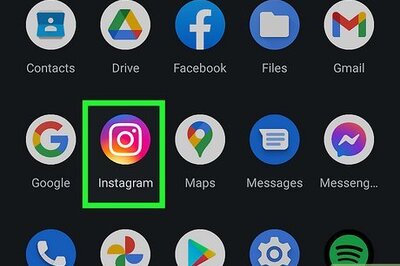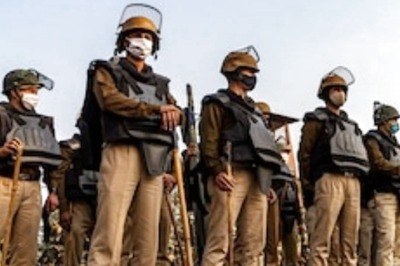
views
Weighing Your Reporting Options

Call 9-1-1 if you see a child in immediate danger. If you directly witness any physical abuse or immediate danger at a child’s daycare, call emergency services immediately. File a police report as soon as possible if you saw or have any direct evidence of situations that may constitute abuse or endangerment.

Search online to find your state’s child safety or child services office. In most cases, you will register an official report with your state’s office of child services or child safety. Search online to find the office or department in your state that handles child safety issues. In some states, this may be its own department. In other states it may be a division under another department, like the department of social services. If you do not have consistent internet access or cannot find the correct office online, call 3-1-1. In most U.S. cities and towns, this line can connect you to information about local services.

Look into what constitutes a violation in your area. The exact definition and parameters of a daycare violation will vary from state to state. Check with your local child safety office to get guidance on what specifically constitutes a violation according to your state and local laws. Typically, government offices will not handle things like tuition disputes, disagreements about curriculum content, or other minor disputes. Government offices instead generally pay more attention to issues like licensing violations, abusive and/or neglectful behavior, or criminal activity from the daycare provider during or after daycare hours.

Consider the evidence for your report. If you have any legitimate reason to suspect any kind of violation from a daycare, you should report it. You do not need to witness or record a violation for your report to be considered valid, and in most cases it is better to be safe than sorry. In cases where you haven’t directly heard or looked into a specific violation, though, you should consider your source. If your normally happy and outgoing child frequently comes home nervous, sad, and talking about their mean daycare instructor, for example, there may be cause for concern. If, however, your neighbor tells you stories about their cousin’s kid who had a bad teacher there 15 years ago, you may want to do more investigating on your own before filing a report.

Try to solve minor disputes with the daycare first. If your issue is a minor dispute, such as a disagreement about tuition or schoolyard behavior, talk to the daycare center first. Let them know your concerns and try to work toward a solution that is beneficial for both you and the daycare. If, for example, you and your child’s daycare teacher disagree on matters of religious beliefs, you may say to them, “I respect that you have your own belief system, but I am raising my child in my tradition. I won’t ask you to teach them about my faith, but please do not teach them behaviors that actively go against it.” If your complaint cannot be resolved directly with the daycare facility, you still need to consider if it is in the scope of your local child safety office. An unresolved complaint does not always directly translate into a reportable violation.
Filing a Report with Your State Agency

Review the agency’s preferred contact information. Depending upon your state’s policies, you may be able to contact your local child services office by phone, mail, or email. Look over your local office’s website to see how they accept warnings and complaints regarding child safety. Not all offices take online complaints or reports. Some may require a phone call or mailed written report. While most offices will allow you to make an anonymous report, if you submit online or in writing, they may have to release certain information about your email address or return address. Consider this when you file your report. If you plan on calling, check the office’s regular business hours to make sure you are able to speak with a live person.

Provide the name of the daycare center and any involved employees. When you file your report, you need to let the state agency know about anyone who you suspect is involved. This means you need to let them know not only the name of the daycare center, but any employees and volunteers that you think may be involved in any violations. If you are unsure of a certain employee or volunteer’s name, you may be able to provide a brief physical description.

Outline the perceived or suspected violations as completely as possible. When you make an official report, try to provide as much detail as possible. Let the office know what types of violations you suspect, and why you suspect them. The more detail you can provide, the more complete the report will be. Do provide as much information as you can. Do not guess or lie about information you do not have. Your report will typically be investigated based on good faith. There is no need to fabricate additional details.
Taking Additional Measures

Reach out to local child and family services nonprofits. Many states and metropolitan areas have branches of nonprofits such as Childhelp, which are dedicated to aiding the victims of child abuse. Look for an organization in your area that offers intervention programs or is otherwise involved in regulating and reporting local instances of child abuse. If you are in the U.S., you can call the Childhelp National Child Abuse Hotline at 1-800-4-A-CHILD (1-800-422-4453).

Alert your local media outlets. Media coverage is often an effective means of inciting action. Alert your local news agencies and radio stations, as well as websites that cover local news and events, to let them know what you have seen. The coverage not only has the ability to inspire action in your community, it can also warn people about a potentially dangerous environment. This should be done in addition to filing a formal report.

Post on social media. Just like local media coverage, social media can help your complaints and concerns get attention in your community. Try leaving reviews on the daycare’s Facebook and Yelp page, and link it out to your own social media. This gets the information out to even more people.

Consider any additional action you may want to take against the facility. In addition to filing a formal complaint, you have the option of taking additional action in the form of a civil claim. If you are the parent or guardian of a child who you believe was physically or psychologically harmed or neglected by a daycare, you may choose to file a civil lawsuit. This can hold the daycare provider financially responsible for things like medical bills, therapy, and alternative child care. Local law enforcement and licensing officials will ultimately decide if any criminal charges are justified.




















Comments
0 comment